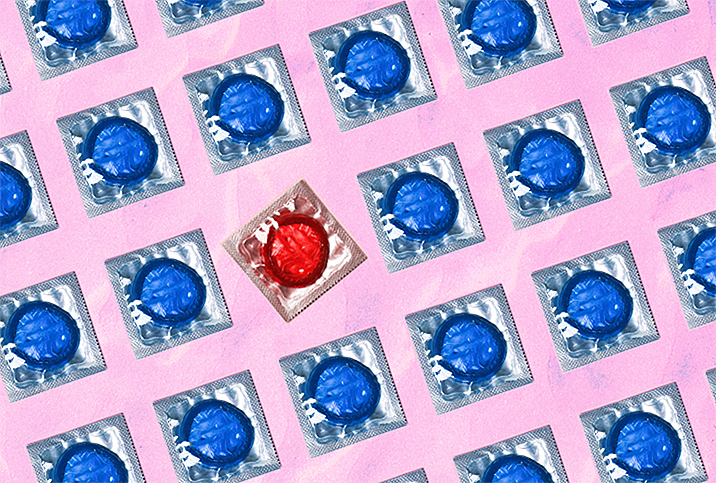Living and Dating With OCD Requires Open Communication and Trust

It's been estimated that obsessive-compulsive disorder affects about 2.3 percent of U.S. adults at some point in their lifetime. However, the range of symptoms and the degree to which they impair an individual's life may vary significantly, according to the National Institute of Mental Health.
Obsessive-compulsive disorder (OCD) can have a major impact on your life and your romantic relationships because it ultimately affects how your brain functions, as well as your thoughts and your behaviors.
Research suggests a link between OCD and sexual dysfunction, including dissatisfaction with a partner and overall disgust with any sexual activity, a fear of having sex, a lessening of libido and overall worse sexual function. Hypersexuality can also be a symptom of OCD.
To learn more about living and dating with OCD, we spoke to experts who work with patients to help them lead healthier and more fulfilling lives.
Depending on the type of obsessive-compulsive disorder an individual has, the effectiveness of the treatment plan and the severity of symptoms, the condition can have a mild to very severe impact on a person's life.
"It's very difficult to live with OCD, especially when the symptoms are severe or life-altering. Many people with OCD express intense frustration at their inability to control their thoughts and behaviors," said Rosalind Pistilli, L.C.S.W., a therapist and executive director of Open Arms Counseling and Transition Center in Colorado. "There is a lot of shame and guilt attached to these symptoms, and many people will withdraw rather than risk their symptoms becoming an embarrassment publicly."
Dating with OCD
The primary way in which obsessive-compulsive disorder can affect dating life is the shame and guilt an individual may carry, feelings that are often associated with the condition, Pistilli said.
"Many people have anxiety about sleeping over with a partner or having a partner stay at their home due to the vulnerability of having their symptoms become apparent," she explained. "Many people with OCD become skilled at masking their symptoms for short periods in public, but that becomes more difficult to manage when you have a new person in your private space. The anxiety can become so overwhelming that the partner can appear to be disinterested in the relationship progressing due to being afraid to share private space with the person they are dating."
Faisal Tai, M.D., a psychiatrist and the CEO of Psychiatry of Texas in Houston, agreed that obsessive-compulsive disorder can affect romantic relationships.
"Some individuals diagnosed with OCD struggle to be fully present during sex because they are having intrusive thoughts," he said. "This can present challenges in relationships."
William Anixter, M.D., a psychiatrist at CooperRiis Healing Community, based in Asheville, North Carolina, said the medications that work for OCD, with a couple of exceptions, are primarily what are called SSRIs (selective serotonin reuptake inhibitors), better known by their brand names Lexapro, Paxil, Prozac and Zoloft. Unfortunately, these medications can have sexual side effects, which can further impact relationships.
"I have seen many, many cases where someone is treated, maybe more for depression than OCD, by a primary care doctor with a prescription for [an SSRI] and begins to experience sexual problems and they've not learned that those are a common side effect of the medication," he said. "And it produces problems—sometimes devastating problems—in a relationship. So a man may begin to experience decreased libido. His wife might say, 'I know you, it's not like you to go for a week or two weeks without wanting some, and you're not asking me for it.' Not having that explanation that it was a side effect of the medication may plant the seed of doubt regarding infidelity in a relationship, and I've seen relationships really damaged by that."
Anixter added that obsessive-compulsive disorder can have other ramifications in a person's dating life, depending on the individual's specific symptoms.
"Let's say someone has OCD issues with symmetry and organization so they need to have their clothes hung in the closet a certain way," he said. "Their clothes in the drawer are set out in a certain way. The books on their shelves all have to be perfectly vertical, and if they walk into someone's apartment and their bookshelves look like my bookshelves tend to look—some of them vertical, some of them leaning one way, some leaning the other way—they may feel a very strong compulsion to get up and straighten that person's shelf out, which is not always appreciated and [actions like that] can affect your dating life."
Talking to your partner about dating with OCD
Whenever you have a physical health condition such as HIV, herpes or some other highly stigmatized disorder, or a mental health condition such as anxiety, depression or obsessive-compulsive disorder, it may prove difficult to be vulnerable enough to disclose your diagnosis to a partner, especially if you have only recently begun dating.
It takes a lot of courage and trust to open up and be vulnerable about such conditions, particularly when there are negative stigmas or unhealthy and problematic misconceptions that are continually perpetuated by society, such as with OCD.
However, if you're able to trust your partner and have an honest and open discussion, you will likely find it freeing, which may allow you to turn to your partner for support. Those who love you should not judge you. Disclosing your obsessive-compulsive disorder may serve as a barometer for the merit of the relationship. If your partner is unsupportive, judgmental, pulls away or shows a lack of empathy, they may not be the best partner for you.
Pistilli recommended the best way to tell your partner about your anxiety with regard to dating with OCD is to be as honest as possible.
"Having your partner attend a session with your therapist, to have them answer any questions or concerns they may have, can also be very beneficial," she added. "Being open and honest about these thoughts and behaviors can allow a partner to be in a supportive space to assist patients in navigating these symptoms and the resulting anxiety."
Anixter said telling your partner about OCD is often prompted by the mutual awareness of symptoms, making it necessary—and beneficial—to have an honest discussion.
"I think back to the movie 'As Good As It Gets' with Jack Nicholson," he said. "He wants to go out with his love interest, but as they walk along the sidewalk, he has to carefully avoid stepping on the cracks between the sidewalk, so it doesn't take long for her to catch on. There's something going on with him. So I think telling your partner is often something that takes place after your partner has already figured out there's something going on."
He provided an example that is often true to life for couples where one person has obsessive-compulsive disorder.
"Let's say you're in a restaurant and you're about to order and you get up to wash your hands, but you don't come back for 45 minutes," Anixter said. "I think your dinner companion would think there's something going on that's unusual. Meanwhile, the person in the bathroom washing is aware that their time is rolling by and it's becoming more and more conspicuous. That stress tends to fuel the thoughts that maybe I'm not cleaning up and maybe I will pass this contamination on to someone else."
Prevention, therapy and aftercare for OCD
Unfortunately, since we don't know exactly what causes obsessive-compulsive disorder, there are no known effective preventive measures for the condition. However, Anna Jackson, a psychotherapist in London, explained there are potential risk factors for OCD, such as high levels of stress and an inability to cope with uncertainty.
Once symptoms of obsessive-compulsive disorder become apparent, there are plenty of treatment options.
Jackson noted the best treatment outcome is learning how to manage OCD.
"This doesn't mean the individual will always have OCD, but it can rear its head at any occasion throughout life," she said. "Being able to spot it quickly, identify it and deal with it as much as possible there and then is probably the best long-term resolution."
Pistilli agreed that obsessive-compulsive disorder is treatable if you get the right kind of care.
"OCD is very treatable and can be managed through therapy," she added. "The prognosis is very good for patients that receive treatment, and many are able to control their symptoms."
Although living and dating with OCD can be challenging, getting the right treatment and finding a supportive partner can help minimize the impact and improve your overall quality of life.


















